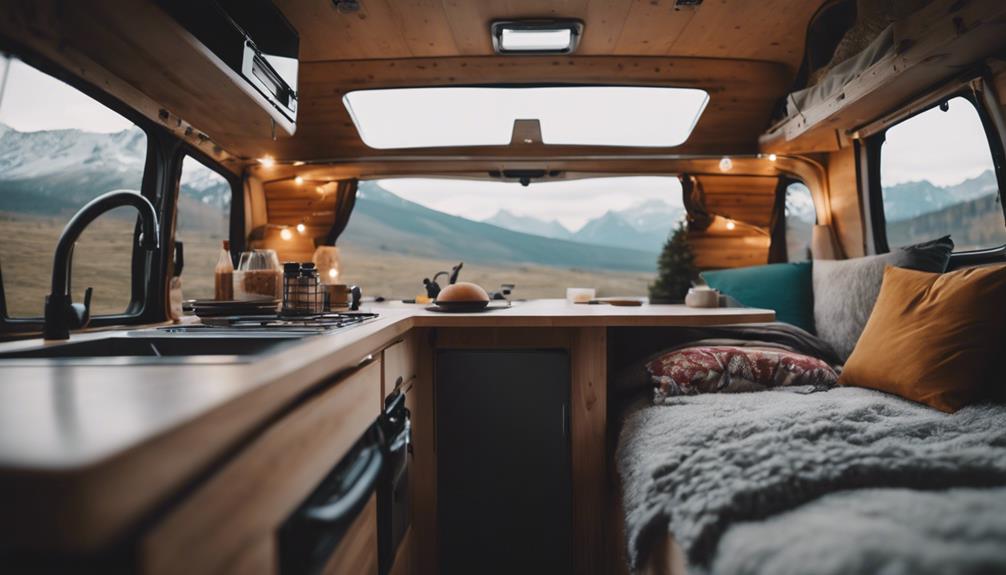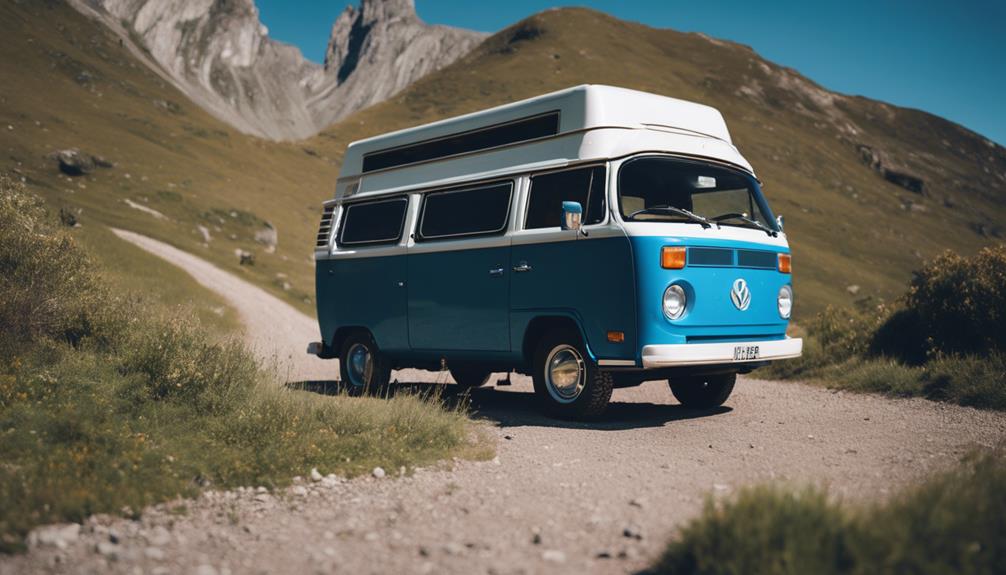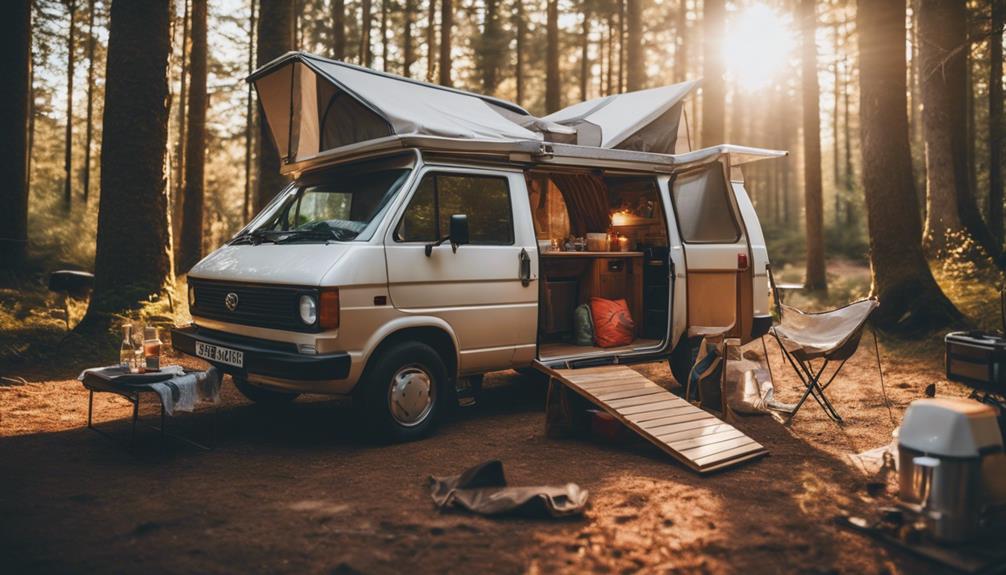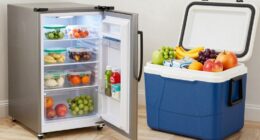When it comes to choosing the best size van for your camper conversion, it really depends on your needs. Small vans are great for solo travelers or couples, offering easy driving and parking. Medium vans strike a nice balance for small families, while large vans give you ample space for built-in kitchens and bathrooms, though they come with higher fuel costs. Think about how much comfort and storage you require, and take maneuverability into account. Whichever size you choose, there are innovative solutions to optimize your space that can make your conversion even better!
Introduction
When choosing the best size van for your camper conversion, you'll want to take into account how many people you'll be traveling with and the features you need. The right van can greatly enhance your experience on the road.
If you're traveling solo or with a partner, small vans like the VW Transporter might suit you perfectly, offering manageable space for driving and parking. However, if you have a small family or a group, medium vans such as the Ford Transit strike a balance between living area and storage needs.
For those looking for more passenger capacity and features, large vans like the Mercedes Sprinter provide ample room for permanent living arrangements. These larger options allow you to optimize your space with built-in kitchens and bathrooms, making them a popular choice for extended trips.
Ultimately, the best vans for your camper conversion will depend on your intended use and how much space you truly need. Remember, while larger vans can accommodate more, they may complicate driving and parking. As a result, assess your travel style and choose wisely to guarantee your van offers both comfort and convenience.
Background Information
When you think about camper conversions, it's helpful to understand the history behind it and how van designs have evolved over time.
Innovations in van design have led to more efficient use of space and improved comfort for travelers.
Van Conversion History Overview
The history of van conversions traces back to the 1960s, driven by a desire for freedom and adventure as the counterculture movement embraced the iconic Volkswagen Bus. During this era, camper vans became symbols of exploration and self-expression.
By the 1970s and 1980s, manufacturers started producing purpose-built camper vans, like those from Dodge and Ford, enhancing comfort and amenities for van life enthusiasts.
The 1990s marked a shift towards DIY van conversions, as more individuals sought personalized mobile living spaces. You'd see a variety of innovative designs tailored to unique lifestyles, reflecting individual tastes and needs.
From the early 2000s onward, online communities emerged, sharing tips and resources that made camper van conversion more accessible to a broader audience.
Recently, the rise of remote work and travel flexibility since 2020 has reignited interest in van life. This has led to a resurgence in camper van conversions, with modern features and high-tech solutions becoming the norm.
Now, you can find countless examples of creativity and adaptability in the ever-evolving van conversion history, inspiring many to commence their own journeys.
Innovations in Van Design
Innovations in van design have transformed camper conversions into highly customizable living spaces that cater to various lifestyles and preferences.
One key advancement is the introduction of modular furniture systems, which allow you to easily reconfigure your space according to your needs. Many modern vans now include integrated solar panel systems, enabling off-grid living and reducing your reliance on traditional power sources.
To enhance thermal efficiency, advanced insulation materials like Reflectix and spray foam are used, guaranteeing comfort in diverse climates. The incorporation of lightweight, durable materials—such as aluminum and composite panels—not only improves fuel efficiency but also makes handling your van easier on the road.
Smart technology has revolutionized user experience with mobile apps that let you monitor electrical systems, water levels, and even climate control right from your phone.
These innovations assure that your camper van isn't just a vehicle but a comfortable, efficient, and convenient home on wheels. With all these advancements, you can create a space that truly reflects your personality and lifestyle, optimizing your experience on the road.
Emerging Van Conversion Technologies
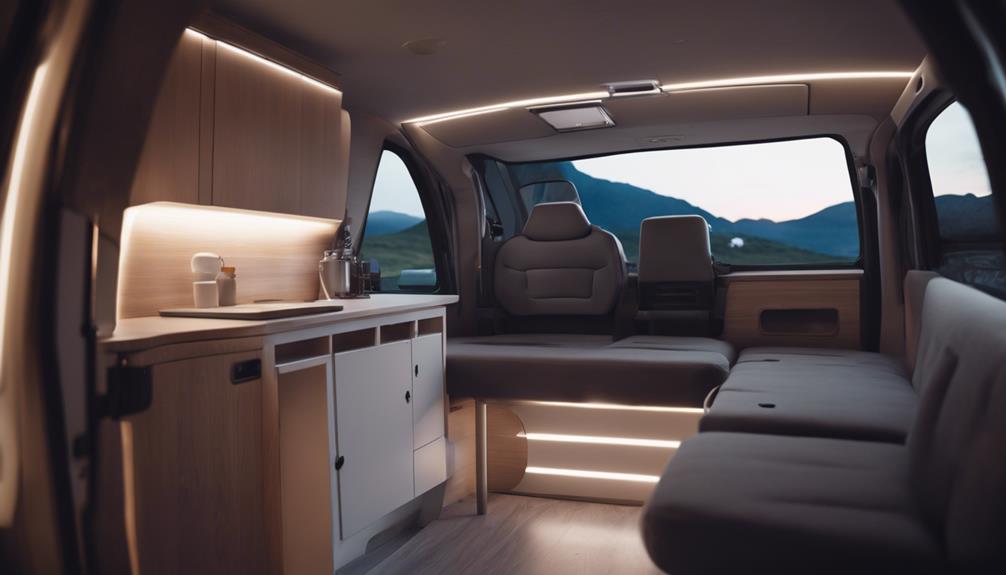
As you explore van conversion options, consider the shift towards eco-friendly materials that not only reduce environmental impact but also enhance the aesthetic of your space.
You'll also want to look into advanced insulation techniques, which can greatly improve energy efficiency and comfort in any climate.
Eco-Friendly Materials in Conversions
Eco-friendly materials are transforming van conversions, making it easier than ever to create a sustainable living space on wheels. By incorporating eco-friendly materials like bamboo, recycled plastics, and sustainably sourced wood, you can greatly reduce your environmental impact. These materials not only promote sustainability but also offer customizable options to suit your style.
Integrating solar panels and energy-efficient appliances into your van guarantees you can live off-grid while minimizing reliance on fossil fuels. This aligns perfectly with eco-conscious travel practices. Additionally, using low-VOC paints and natural sealants enhances healthier indoor air quality, making your living space more pleasant and safe.
Advanced insulation choices, while not the focus here, often utilize renewable resources, contributing to overall energy efficiency in your camper. Choosing environmentally responsible materials throughout your conversion allows you to create a space that's both functional and eco-friendly.
As more van conversion companies prioritize sustainability, you'll find a wealth of options to help you initiate your journey toward a greener lifestyle. Embracing these materials not only benefits the planet but also enriches your travel experience.
Advanced Insulation Techniques
Advanced insulation techniques play an essential role in maximizing your camper van's energy efficiency and comfort, especially in extreme climates. By utilizing materials like Reflectix and spray foam, you can achieve superior thermal performance, keeping your interior temperatures stable. This not only enhances comfort but can also reduce heating and cooling costs by up to 30%.
Incorporating wool insulation further promotes eco-friendliness, offering excellent temperature regulation with the added benefit of being a natural material. Additionally, implementing multi-layer insulation systems that combine reflective and absorptive materials greatly enhances soundproofing, reducing outside noise and improving your living experience.
Emerging technologies, such as insulation panels with built-in vapor barriers, are essential for preventing moisture accumulation, which can lead to mold growth. This contributes to a healthier environment within your camper van, ensuring that you can enjoy your travels without concerns about air quality.
Choosing the right insulation materials is critical for creating a comfortable, energy-efficient space. With these advanced insulation techniques, you can transform your camper van into a cozy retreat, no matter the weather outside.
Cost-Benefit Evaluation
When you're considering a camper van conversion, weighing cost against functionality is essential.
You'll want to analyze how much you're willing to spend versus the benefits you'll gain, including performance and resale value.
Consulting industry experts can also provide valuable insights to help you make the right decision.
Cost Versus Functionality Analysis
Evaluating the cost versus functionality of camper van conversions requires you to carefully weigh your budget against your space and comfort needs.
Larger vans often come with higher purchase and conversion costs, starting around $25,000, but they provide increased living space and amenities, making them ideal for full-time living or accommodating larger groups.
On the other hand, a basic DIY conversion for a smaller van might only set you back about $5,000, but it may limit your storage space and comfort.
Consider fuel efficiency as an essential factor; smaller vans can achieve up to 28 mpg, while larger models may drop to around 10 mpg, impacting your long-term travel expenses.
Resale values also play a significant role in your investment. Well-maintained larger vans like the Mercedes Sprinter tend to retain strong resale values due to their durability and high demand, making them a smarter investment despite the initial costs.
Ultimately, your decision hinges on your intended use. If you prioritize space and comfort for extended trips, larger vans might justify the expense, while smaller vans can be more economical if you're seeking occasional adventures.
Industry Expert Insights
Industry experts emphasize that choosing the right size van for your camper conversion hinges on balancing your budget with your lifestyle needs.
Larger vans, like the Mercedes Sprinter and Ford Transit, provide ample interior space, making them ideal for comfortable living and accommodating family travel. However, these popular van models require a higher initial investment, which can strain your budget planning.
On the other hand, smaller vans such as the Ford Transit Connect are easier on the wallet, both in upfront costs and fuel efficiency. Yet, they may limit your living amenities and require nightly bed conversions, which could impact your overall camper van conversion experience.
DIY enthusiasts might find smaller van conversions range from $5,000 to $10,000, while larger models can start at $7,500 and soar above $100,000 for luxurious builds.
Don't forget about insurance costs; standard coverage may not suffice for your modifications, so tailored motorhome or RV insurance becomes necessary.
Ultimately, evaluating the cost-benefit of your conversion needs will help you select the right van to meet your storage solutions and comfort requirements.
Cost Vs. Performance Assessment
Choosing the right van for your camper conversion involves weighing the upfront costs against the long-term performance and comfort benefits.
Larger vans, like the Mercedes Sprinter or Ford Transit, typically have higher initial purchase and conversion costs but offer durability and better resale value, making them a solid investment for long-term travelers.
On the other hand, smaller vans, such as the Nissan NV200, can be more budget-friendly with lower upfront costs and better fuel efficiency, often achieving around 25-28 mpg. However, they may restrict your living space and amenities, impacting your comfort during trips.
When considering DIY conversions, you can greatly cut costs, with basic setups starting around $5,000 to $10,000. Keep in mind, though, that this approach requires time and skill.
Professional conversions can range from $7,500 to over $100,000, depending on complexity.
Fuel efficiency plays a vital role in your cost vs. performance assessment, especially since larger vans can drop to as low as 10 mpg, leading to higher travel costs.
Ultimately, balancing these factors will help you make the best choice for your camper conversion.
Essential Tools for Conversion
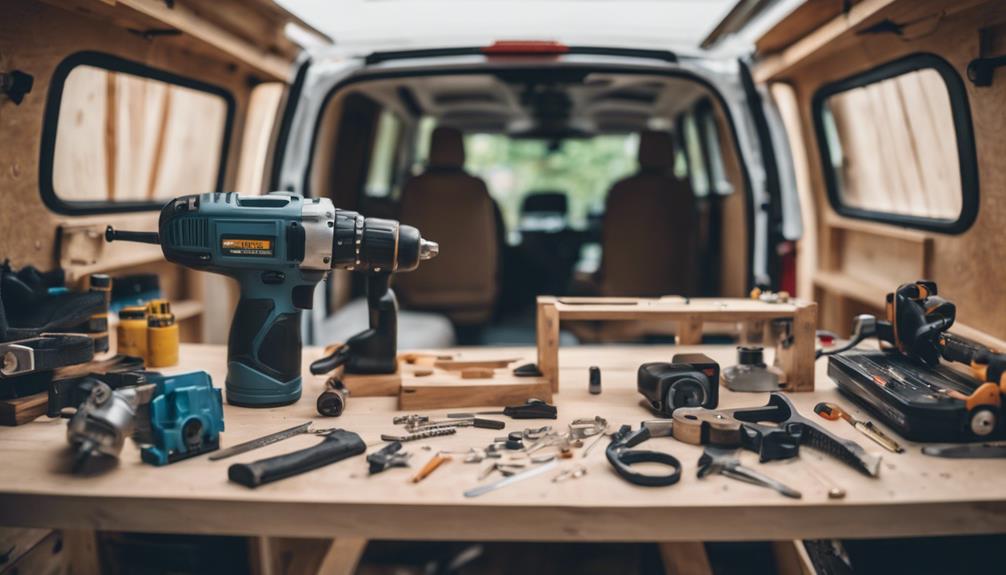
When you start your camper van conversion, having the right tools can make all the difference.
You'll need to understand the conversion process and plan effective layouts, so investing in essential tools like a power drill and a level is key.
Let's explore the must-have tools that'll help you transform your van into a cozy living space.
Conversion Process Overview
What tools do you need to make your camper van conversion a success?
First, a measuring tape is vital for planning your interior layout and ensuring efficient use of space. You'll also need a power drill and saws, like a circular or jigsaw, for cutting materials during the conversion process. A level is critical for installation, ensuring everything is even and secure.
Don't forget a multi-tool or oscillating tool; it's invaluable for making adjustments in tight spaces, which is often necessary for creative campers. Safety equipment such as gloves, goggles, and a dust mask is a must to protect yourself from injuries and harmful particles while working on your home on wheels.
A heat gun can help you remove old insulation or adhesive, while clamps are great for holding materials in place during assembly. Finally, having a thorough toolkit with various screwdrivers, wrenches, and pliers allows you to tackle everything from assembly to electrical installations.
With these essential tools for camper van conversion, you'll be well-equipped to create your ideal living space on the road.
Effective Layout Strategies
Utilizing design software or apps can help you visualize and optimize your van layout, ensuring every inch of space is used effectively.
Start by creating multiple sketches of potential layouts to explore different configurations for sleeping, cooking, and storage. This approach allows you to prioritize must-have features versus nice-to-have elements, streamlining your camper conversion process.
Don't forget to measure and assess vertical space in your van. Maximizing this area can greatly enhance your storage solutions, improving overall organization and comfort in functional living.
Incorporating modular furniture designs is essential; think of benches with hidden storage or convertible tables that serve multiple purposes.
These effective layout strategies not only save space but also add versatility to your living area.
What Makes Small Cargo Vans Ideal for Camper Conversions?
Small cargo van camper conversions are perfect for those who want a compact and economical option for their travels. These vans are easily maneuverable and can navigate tight spaces. They also offer ample storage space for gear and camping essentials. The small size makes them ideal for off-the-grid adventures.
What Makes a Small Cargo Van Ideal for Camper Conversion in Terms of Space Efficiency?
When it comes to small cargo van camper conversion, space efficiency is key. Small cargo vans offer a compact yet versatile interior that can be easily converted into a functional living space. Their size allows for efficient use of space, making them ideal for creating a comfortable and practical camper setup.
Conclusion
Ultimately, choosing the right size van for your camper conversion hinges on your specific needs and lifestyle.
If you're a solo traveler or a couple, a small van might be the best size van for you, offering just enough space without overwhelming you. However, if you plan on full-time living or need to accommodate a family, larger vans provide ample space and better functionality, including the possibility of a permanent bed setup.
Consider your interior layout carefully. Small vans often require nightly bed conversions, which can be inconvenient, while larger vans allow for more comfortable living arrangements. They can also incorporate additional storage solutions, which are essential for maintaining an organized space during long journeys or extended stays.
Larger vans are your best bet if you want amenities like a shower or toilet, as they can house combined cubicles.
Think about how much you value space and functionality in your camper conversion. Ultimately, the right choice depends on your personal requirements, so take the time to assess how you plan to use your van and what features are non-negotiable for your adventures.
Frequently Asked Questions
What Size Van Is Best for Camper Conversion?
When choosing a van for camper conversion, consider your needs. Small vans work for solo travelers, while medium ones suit small families. Large vans offer maximum space and amenities for those seeking comfort during extended trips.
What Vans Are Best for Camper Conversion?
When choosing vans for camper conversion, consider the Ford Transit for versatility, the Mercedes Sprinter for luxury, or the Ram ProMaster for easy maneuverability. Smaller options like the Nissan NV200 suit solo travelers perfectly.
What Is the Best Vehicle for a Camper Van Conversion?
When choosing the best vehicle for a camper van conversion, consider your needs. You'll want a balance of space, drivability, and budget. Popular options like the Ford Transit or Mercedes Sprinter often fit the bill.
How Do I Maximize Space in My Camper Van?
To maximize space in your camper van, use modular furniture, vertical storage, and flexible layouts. Incorporate collapsible kitchenware and swivel seats for added functionality, ensuring every inch serves a purpose while keeping the area organized.
Conclusion
In summary, choosing the right van size for your camper conversion is vital for optimizing your space and enhancing your adventure.
By considering your needs and the latest technologies, you can create a comfortable and functional home on wheels.
Remember to weigh the costs and gather essential tools to make the process smoother.
With careful planning and creativity, you'll transform your van into the perfect getaway, ready for all your journeys ahead.
Happy converting!

